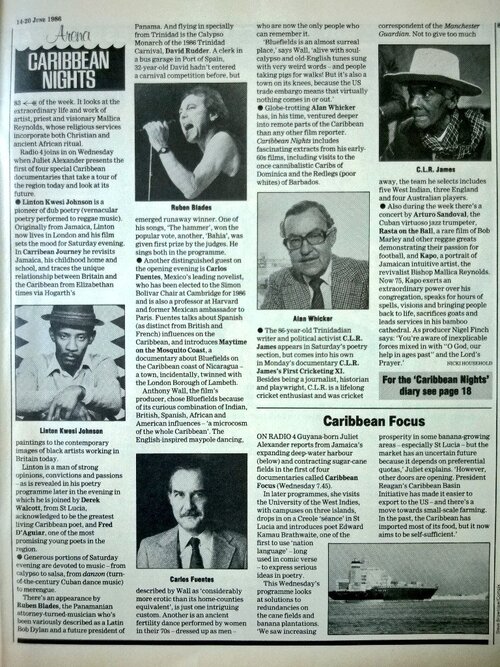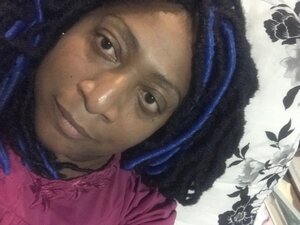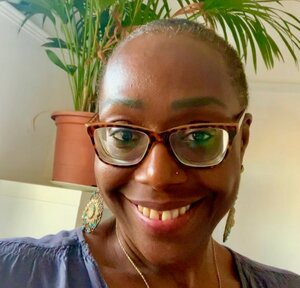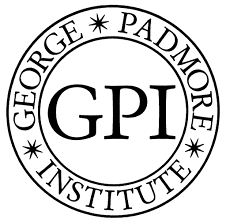It’s hard to believe now that, back in the 1980s the UK had little idea of the wealth of writing which was and has always come out of the Caribbean. In 1986, the BBC’s Arena film Caribbean Nights: Poetry changed all that, when activist and intellectual Darcus Howe chaired a thought-provoking discussion with poet Derek Walcott (who went on to win the Nobel Prize for Literature in 1992), pioneering reggae poet Linton Kwesi Johnson and emerging poet Fred D’Aguiar. Co-hosted with the George Padmore Institute (GPI) in London, presented Arena’s Caribbean Nights: Poetry. Including clips of seminal readings by the late dub poet Michael Smith and Kamau Brathwaite, one of the founding fathers in the use of Caribbean English in poetry, this film introduced Caribbean poetry to a mainstream UK audience, at a time when the International Book Fairs of Radical Black and Third World Books was pioneering in putting diverse authors and artists at the centre of literature festivals (see the GPI webpage for more on the Book Fair archives).
You can still watch responses to the Arena from contemporary activists and poets: the GPI’s Nicole-Rachelle Moore, Jacqueline Bishop, Hannah Lowe and Dorothea Smartt. Read and listen to new poems from award-winning poets Jay Bernard and Anthony Joseph and then try your hand at writing your local memoirs, with a masterclass from author Colin Grant.

CARIBBEAN NIGHTS: Poetry
With Derek Walcott, Linton Kwesi Johnson, Fred D’Aguiar and Darcus Howe in the studio and including C. L. R. James, Michael Smith and Kamau Brathwaite on film.
In 1986, Caribbean culture was thin on the ground, to say the least, on British television. Caribbean Nights was Arena’s attempt to draw attention to what everyone was missing. It began with a five-hour themed Saturday night on BBC Two, with films and discussions from all over the region and a different film each night over the following week, including the first feature documentary on Bob Marley. Here are a few words on its genesis.
We had developed a relationship with Linton Kwesi Johnson and Darcus Howe through two films we’d made together a few years previously. Arena: Brixton to Barbados was a documentary about Carifesta in Barbados in 1981, Linton wrote and presented it and I directed it.
The festival was an eye opener for me, its richness and variety were dazzling: Irakere from Cuba; The Renegades Steel Orchestra from Trinidad; Arrow from Montserrat; Rebirth, a stunning multicultural theatre company from Surinam; and, of course, the writers. Linton introduced me to many of them, including Mervyn Morris, Shake Keane and a young poet from Jamaica, Michael Smith.
Michael Smith was part of the new movement of dub poetry, as it became known, or reggae poetry, as Linton preferred to call it. Linton had pioneered the form in Britain, with Mutabaruka and Oku Onuora doing something similar in Jamaica. Michael was clearly an exceptional talent, his poetry was startlingly original, assured and performed with mesmerising power. For Brixton to Barbados he declaimed his already classic ‘Me Cyaan Believe It’.
The following year, he came to Britain and we made a film here. Arena: Upon Westminster Bridge provided the thematic basis for the poetry section of Caribbean Nights. C. L. R. James was living in Brixton at the top of the house of the Race Today Collective on the corner of Railton and, fortuitously, Shakespeare Roads. There C. L. R .would hold court and offer his inimitable knowledge and wisdom. He greatly admired Linton’s poetry and political stand but he was also renowned for his love of the classic works of English Literature. Michael made it clear those works said nothing positive to him. C. L. R. singled out Shelley and Keats and proposed that, while their literary language could not have been more different to that of the reggae poets, their revolutionary sentiments were identical. Michael was persuaded.
Upon Westminster Bridge, through Michael, C. L. R. and Linton, explores the correspondences and differences between historic English literature and this new poetry expressed in the language of reggae DJs and everyday Jamaican speech. That dialectic became the basis of the studio discussion, with Derek Walcott, who wholeheartedly embraced the grand literary tradition, Linton and the young Fred D’Aguiar. The result, judiciously supervised by Darcus, is a vibrant, passionate exchange of fiercely held convictions and beliefs and a demonstration of the unique, extraordinary breadth of Caribbean poetry.
Anthony Wall
6 May 2020
YOUR LOCAL ARENA: RESPONDING TO Caribbean Nights: Poetry
Responding to the film
INSPIRED BY ARENA’S Caribbean Nights: Poetry
New Poetry by Jay Bernard and Anthony Joseph
Commissioned Poets
WRITING YOUR MEMOIR: A Masterclass from Colin Grant
Interviews
An Interview with Anthony Wall
An Interview with Roxy Harris
Roxy Harris is a founder Trustee (1991) of the George Padmore Institute and is its current Chair. He was a member of The Black Parents' Movement, played a major part in the International Bookfair of Radical Black & Third World Books (1982-95), was a member of the New Cross Massacre Action Committee and for many years was a coordinator and teacher at the George Padmore Supplementary School. He has taught in secondary schools, further education colleges, adult education institutes and in universities. He has authored and edited numerous books and other publications.
About the George Padmore Institute
Founded by John La Rose, the late Trinidadian activist, poet and trade unionist, the George Padmore Institute is an archive and educational research centre based in north London which houses unique archive collections relating to the political, social and cultural organisations of the UK’s black, Asian and minority ethnic communities over the last 70 years. Collections include archives from the UK’s first black bookshop and publisher New Beacon Books (founded in 1966 by John La Rose and Sarah White) and from the International Book Fairs of Radical Black and Third World Books (1982-95) among others. Selected publications include: Foundations of a Movement, ed. Roxy Harris & Sarah White (London: New Beacon Books, 1991); The Caribbean Artists' Movement 1966-1972: A Literary & Cultural History by Anne Walmsley (London: New Beacon Books, 1992); and A Meeting of the Continents: The International Book Fair of Radical Black and Third World Books 1982-95 – Revisited, ed. by Sarah White, Roxy Harris and Sharmilla Beezmohun (London: New Beacon Books/George Padmore Institute, 2005). See https://www.georgepadmoreinstitute.org/


.jpeg)

+Chris+Scott+(1).jpeg)
+Joshua+Virasami.jpeg)
.jpg)
 (1).jpg)
